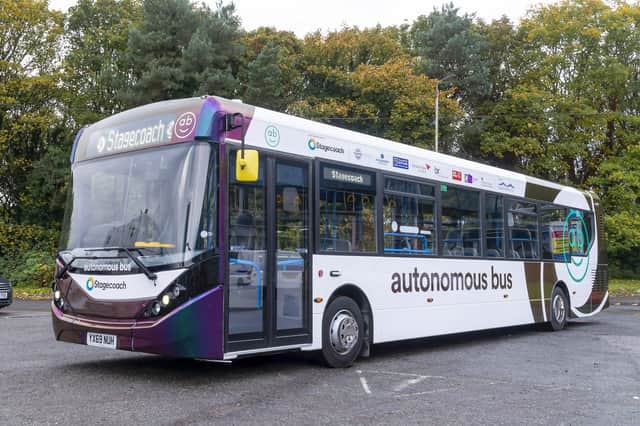Passengers told to wear seatbelts on UK's first autonomous bus service in Scotland


The instructions for the new Autonomous Bus No.1 (AB1), operated by Stagecoach, were revealed in a new video on how to travel aboard the new vehicles.
Unlike a standard human-driving bus, managers of these new robot buses, launching between Fife and Edinburgh this spring, advise their passengers buckle in for the duration of the trip.
Advertisement
Hide AdAdvertisement
Hide AdThe instructions said: “Seatbelts are fitted and should be worn during your journey.”
Stagecoach said the seatbelts were to ensure customer comfort and safety.
The driverless buses, part of the wider CAVForth project, have sensors enabling them to travel on pre-selected roads at up to 50mph.
They will have two members of staff on board: a safety driver will sit in the driver's seat to monitor the technology, and a so-called bus captain who will help passengers with boarding, buying tickets and queries.
Advertisement
Hide AdAdvertisement
Hide AdThe 14-mile route, due to open on for public use on 15 May, will run between Ferrytoll park and ride in Fife and Edinburgh Park train and tram interchange, taking passengers across the Forth Bridges.
Contactless payments, concessionary passes and applicable multi-trip tickets are accepted onboard.
Passengers can also track their journey on the Stagecoach app.
Like a standard bus, there are bells on board to press whenever customers wish to get off. Though Stagecoach said the AB1 will stop at every stop on the route.
Advertisement
Hide AdAdvertisement
Hide AdA spokesperson for the bus operator said: "Many of our standard vehicles are fitted with seatbelts for our customer's comfort and safety.
"Seatbelts on this vehicle type are not any more necessary than on our normal services, and we have worked with the CAVForth project team to take on board all safety-related advice and guidance to ensure customer comfort."
At a previous trial in mid-2021, Stagecoach head of operational standards Louise Simpson said the public still needed to be convinced about the safety of autonomous buses; she said people were worried about their personal safety, the accessibility of the vehicle and what would happen in an emergency.
Concerns were also raised about the transport innovation simply being down to getting rid of drivers to save money, but Ms Simpson defended the autonomous fleet saying they were to boost road safety, connectivity and efficiency.
Advertisement
Hide AdAdvertisement
Hide AdA spokesperson for Edinburgh Bus Users Group said: "It's hard to follow the logic here. Wearing seat belts in cars is compulsory for good reason. But this is a bus, where the incidence of harm is already 60 per cent lower and mainly involves ‘minor injuries'. A bus using safe roads, running at under 50mph, and stopping at every bus stop. With a 'safety driver' and technology that's claimed to be safe.
“If Stagecoach is saying the seatbelts are no more necessary than on normal services, why not leave it to the passengers to decide if they want to wear them?. What next, compulsory pre-booking for every trip?"
Comment Guidelines
National World encourages reader discussion on our stories. User feedback, insights and back-and-forth exchanges add a rich layer of context to reporting. Please review our Community Guidelines before commenting.